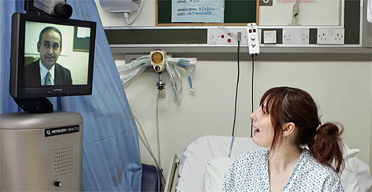
Hospital specialist Dr Robbie is the perfect doctor: he never needs a holiday, never takes a lunch break and is on call 24-hours a day seven days a week. He will go to a patient's bedside whenever needed and has every detail of their medical history at his fingertips.
But Dr Robbie is no ordinary doctor - he is a robot being tested on UK hospital wards as part of a revolution in healthcare technology.
Nicknamed "Sister Mary and Dr Robbie" by hospital staff at St Mary's hospital, west London, the RP6 robot can see the patient, view patient records, analyse test results and even ask questions.
The robodoc's body is shaped like a dustbin and its head is a computer screen - which can move up and down and from side to side - with a webcam on top.
The machine is controlled by a doctor, using a joy stick, sitting at a remote computer. As the robot moves around the patient's bed the doctor's face appears on its computer screen as if it was a personal consultation.
The RP6 robot is being tested on a general surgery ward and in casualty at St Mary's, which is the first UK hospital to use the robot. It is also being piloted at three hospitals in the US and one in France.
The project's lead surgical specialist registrar and research fellow, Parv Sains, said today: "Our robots would certainly never replace all doctors on all ward rounds, but they are a communication tool which allows a doctor to have direct contact with their patient if they are unable to get to them.
"If we look at the current strains on the NHS many senior doctors with skills and knowledge are required to be in several places at once. This is a solution to potentially provide their expertise from a remote location and may be a significant step forward in patient care."
The robot could also have a role in helping to train junior doctors delivering lectures by specialists unable to attend.
It is the latest step in integrating robots in healthcare being developed by Professor Sir Ara Darzi, head of Imperial College London's division of surgery, anaesthetics and intensive care and a surgeon at St Mary's.
He said: "This is a revolutionary concept which opens new avenues for telemedicine research and integrates technology with healthcare at a grass roots level."
· A robot has also carried out a transplant operation for the first time in Britain at Guy's hospital in London, it has been revealed. The £1m machine, one of only two in the UK, took a kidneyfrom Pauline Payne's body using two mechanical arms.
Conventional surgery was then employed to implant the carefully preserved kidney into her seriously ill partner, Raymond Jackson.
The da Vinci robot has been used before in Britain to remove diseased organs and carry out simple reconstructive surgery. But this is the first time anything as critical and difficult as a live organ transplant has been attempted with the machine in the UK.

